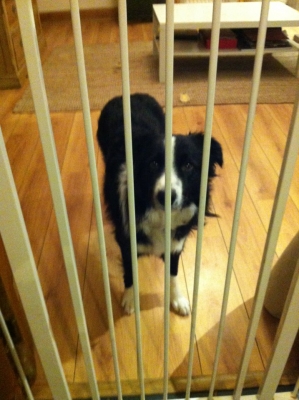Who’s at the door? Santa or Satan?

In terms of dog/owner frustration & concern, coming a close third place behind recall & dog/dog reactivity issues, is greeting guests. Unlike recall or dog/dog reactivity, training appropriate greetings should not cause as much stress as it seems to. The fact that the challenge is occurring in an owner's home, means people have complete control of the environment in which they are training. As such, it should be easy to manage their dog’s behaviour & retrain a greeting acceptable to all concerned. So why is it such a common challenge then?
Most dogs can be classed into three categories when it comes to greeting guests. The first type of dog behaves like it’s Christmas. Joy, of joys, Santa must be at the door each time someone knocks. The level of excitement & enthusiasm to greet the guest rises to levels beyond the dog or the owner’s control. This quickly results in a lunatic fur ball, abound (literally) with glee, paws akimbo, ready to greet the unfortunate guest, who has no idea they possess such cause for excitement. In turn, the owner, at pains to control their hyperactive Santa loving dog, joins in the fun, saying the dog’s name over again in an excited voice which winds fido up more. They often attempt to grab or restrain the dog which only makes things worse.
The alternative group of dogs believe that their home is their sancuary. The front door is the portal which divides safety & the big bad world. Through this portal, each guest carries the guise of Satan. Such dogs are worried for the safety of their property or themselves. The former feels the need to guard their home or owner. The unsuspecting visitor has no idea they have been classed as evil as they are met with a dog ready to protect (lunging, jumping, barking, growling and/or biting). Owners of such dogs, in a vain attempt to take control, often shout commands & use physical restraint, finally resorting to locking the dog away from visitors to keep everyone safe.
Our other Satan wary dog are terrified for their own safety. Such dogs run to hide, attempt to go deeper into the sanctuary, shy away, beg to be left alone. Owners often attempt placation, reassurance & cajoling. They drag their dogs to greet guests, asking visitors to feed, stroke or cuddle them. All the time such dogs believe they are are being asked to make friends with the devil.
While I know there will be rare folk whose dogs don’t fall into the three categories listed above, for the average pet dog owner, it’s far more common for the Santa or the Satan dog to prevail. For this reason, allowing your dog to greet at the front door, is a bad idea for all concerned. Dogs become proficient at behaviours they practice, so if you want your dog to learn calm, controlled greetings, practice this. Manage your dog’s behaviour & that of your guests carefully.
- Use a dog gate to ensure your dog doesn’t greet guests at the front door.
- Teach them that the doorbell is a signal to run behind the gate for a tasty treat. Don’t wait for guests to arrive to practice this.
- Ask guests to COMPLETELY ignore your dog. Lead by example-ignore your dog at this point also.
- Make tea, allow your dog to see & hear the guest through the gate. Wait for this new arrival to lose its novelty.
- With all three dog types, use ‘Treat & Retreat’ training but use food which is of extremely high value, real warm roast chicken or fresh cooked liver works best.
The ‘Oh my dog, Santa’s here’ type:
If you’ve got a Santa loving dog, he will be desperate to say ‘hi’ so watch for signs that he’s given up trying, wait a few minutes more & only then proceed to train him. If Santa loving dogs jump, the dog gate becomes a buffer. Guests should walk away & approach the gate again once the dog is calm. Teach him that guests throw food over his shoulder, so wasting time/energy approaching the guest is pointless, as food comes to him, not the other way around. Guests should begin to train calm sit greetings after several ‘free’ treat/retreat sessions.
The ‘Satan has come to take over my home and/or owner’ type:
You really don’t want dogs who guard their property or their owners to approach strangers to your home. Close proximity to guests means such dogs may try to control visitors through their actions (stalking/lunging/growling/biting). Make decisions for them to demonstrate clearly that guests are non- theatening & are also in control. When such a dog has relaxed, request that visitors calmly approach the dog gate & toss mouthwateringly tasty food over the dog’s shoulder. They should retreat , then repeat the approach until the dog is showing relaxed body language rather than reactive signs, when visitors move towards the gate. Guests can begin to request a sit & repeat the treat/retreat training thus controlling the greeting & reward.
The ‘Satan has come to get me’ type:
Our last group of dogs don’t want to approach guests anyway, they want to be left alone. Respect this by providing a space to hide in (covered crate) while guests visit. Should you chose to change their mind about visitors, do so using treat/retreat training but allow the dog to decide if he wants to take further steps to greet. Ask guests to allow such dogs to approach the dog gate, not the other way around. Toss food. Never at this stage put hands down to the dog. If allowing this cautious greeter to join your gathering, remind guests that most of these dogs want to sniff visitors to reassure themselves they are not in fact Satan, not because they want to be friends with or stroked by strangers.
A simple step which can encourage more appropriate behaviour in our dogs, is often one which owners seem most reluctant to take. People are so desperate for guests to like their dog & vice versa, they continue to put their pets into fail/fail situations. Situations where everyone gets frustrated or upset. Whether your dog expects Santa or Satan at the front door, do him a favour & help him to get it right. Take control of greetings so your dog doesn’t have to!




